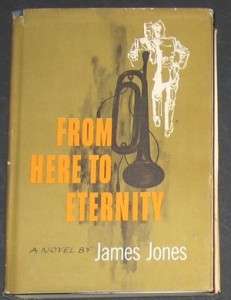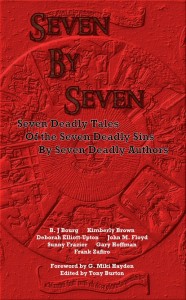Thursday, November 6: Femme Fatale
SHORT WORKS
by Deborah Elliott-Upton
I remember him best for From Here to Eternity and The Thin Red Line among the best war literature of Americans. Probably for this reason: I think it is one of the few war books written by somebody who was there, in the military and in combat. Most of our other war books are not.” – Joseph Heller
 Though many recognize his National Book Award winner of 1952, From Here to Eternity, I wonder how many know the author’s name? Besides writing war novels from the eye of someone who knew what really went on during war, James Jones also wrote many short stories and articles published in the late 1940s through the 1970s.
Though many recognize his National Book Award winner of 1952, From Here to Eternity, I wonder how many know the author’s name? Besides writing war novels from the eye of someone who knew what really went on during war, James Jones also wrote many short stories and articles published in the late 1940s through the 1970s.
One might wonder why after winning the National Book Award for a phenomenal novel, he would bother with short stories. Except … those of us who write don’t necessarily stay true to a particular length.
 I’d not attempted much in the way of flash fiction (complete stories from 100 to 1,000 words in length) when I “auditioned” for a spot in an anthology put together by editor Tony Burton. The flash fiction stories that John Floyd and I wrote for the anthology Seven by Seven (Wolfmont Publishing, 2006)1 were limited to 600. That’s definitely a short story – especially when a crime had to be included.
I’d not attempted much in the way of flash fiction (complete stories from 100 to 1,000 words in length) when I “auditioned” for a spot in an anthology put together by editor Tony Burton. The flash fiction stories that John Floyd and I wrote for the anthology Seven by Seven (Wolfmont Publishing, 2006)1 were limited to 600. That’s definitely a short story – especially when a crime had to be included.
In Carols and Crimes, Gifts and Grifters, the holiday crime stories anthology, we were not limited by such a tiny word count. My story, “A Piece of Christmas” had more room to breathe. I could develop settings, characterization and subplots a bit more. It was nice to spread out.
“But, why write short stories when you can write a novel and make more money?” non-writers ask.
First, it isn’t all about the money – although, a paycheck is quite nice. Also, authors who enjoy writing in different lengths and genres are in great company: Jan Burke, G. Miki Hayden, John Updike, Paul Guyot, Gabriel Garcia Marquez, Bill Crider, Sunny Frazier and many, many others.
I think writing has to do with the love of the story, no matter the length. Every word counts especially in a mystery short story. In real life, crimes are solved rather quickly, or often not at all – otherwise we wouldn’t have all those stacks of cold cases for law students to filter through and discover new technology makes it possible to find and convict a killer that the past let go free. Writing a short story is (for me) like working against time on a case. Within this realm, I can play detective and villain and still sleep at night. And I can be done a lot sooner than when I’m writing a novel.
When I began writing, I chose short stories as much as they chose me. Four or five typed pages usually sufficed for me to create a problem and solve it. In my first few writing classes, I kept strictly to the short story venue even though my classmates had moved onto writing their first novels. My intention was to write longer and longer short stories to test myself and see if I could do it. When I finished my first novella – after being warned no one could actually sell a novella at that time unless you were Stephen King – I was elated. Maybe – just maybe – I could finish a novel. The 350-400 page manuscript seemed daunting at first.
Even now, I’m a bit hesitant with a novel until I am past page 100. For me, that number is like the song: If you can make it there, You can make it anywhere.
I enjoy reading stories of differing lengths from many differing authors. I can’t say I only read cozies or police procedurals or thrillers because I never know which will be the next startlingly wonderful experience until I read it, which is why I purchase short story collections and magazines like Alfred Hitchcock and Ellery Queen. It’s like opening up a gift full of surprises every month.
I want to have a writing career like James Jones, J. D. Salinger and Ernest Hemingway. When I’m lying on my death bed, I want to say I wrote what I wanted to write and sometimes those were really short works.
- I have signed copies of Seven by Seven and Carols and Crimes, Gifts and Grifters available for sale. Visit my website for details. [↩]




















“Jan Burke, G. Miki Hayden, John Updike, Paul Guyot, Gabriel Garcia Marquez, Bill Crider, Sunny Frazier”
Uh… [cue music] one of these things doesn’t belong here, one of these things isn’t quite the same… [/music]
They all are quite wonderful writers who do write many different word count projects and some of them are not the quiet, shy types. Hmm, wonder which ones?
I had to do two things before I could write “short” pieces.
Screenplay classes because one has to be succinct and has to move the story.
The other was an online short story course. I liked it so much I took it twice.
Learning to write “short” makes it easier to write “long” pieces.
Thanks for the reminder.
I know this is the first and last time my name will ever be used in a sentence with Gabriel Garcia Marquez, and I thank you for that brief moment of fantasy.
That great writer of short mysteries, Jack Ritchie, used to say he never read a novel that wouldn’t have made a better short story.
I enjoy relaxing with a good novel, yet all too often the padding becomes apparent and it dawns on me that I’m reading a 300 page short story.
Ritchie must not have read LONESOME DOVE or BLOOD MERIDIAN or AMERICAN PASTORAL. Or THE STAND or THE LORD OF THE RINGS.
Could one “make” short stories of these tales? Sure.
Better? No way.
Short stories or novels? I love ’em both! But I have re-read more short stories than novels. Possibly because of time, but I’ve puzzled over many more re-read mystery short stories than novels.
I’m sure Ritchie would have made a few exceptions, perhaps many, but probably not some of those cited because he died before they were published. One example he named was Hugo describing the sewer system of Paris in 30,000 words. Ritchie believed it could have been done just as effectively in three paragraphs.